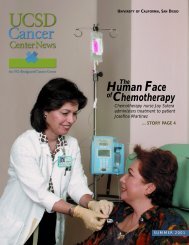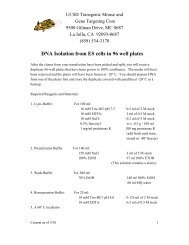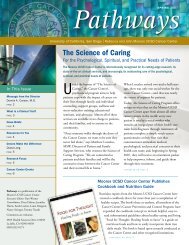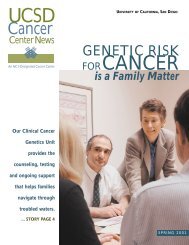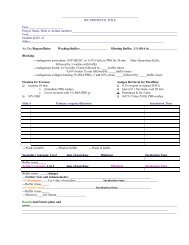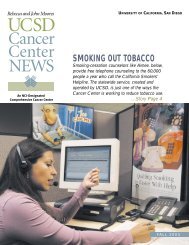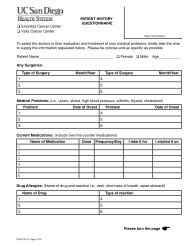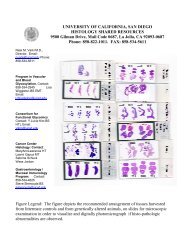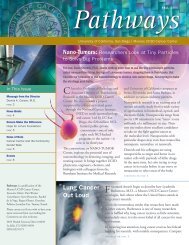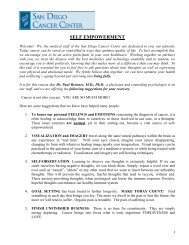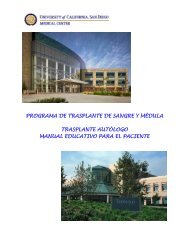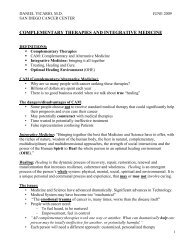Autologous Transplant Patient Education Manual - Moores Cancer ...
Autologous Transplant Patient Education Manual - Moores Cancer ...
Autologous Transplant Patient Education Manual - Moores Cancer ...
Create successful ePaper yourself
Turn your PDF publications into a flip-book with our unique Google optimized e-Paper software.
Mouth or Oral care<br />
Thorough mouth care is important to maintain healthy gums and teeth. You will need to<br />
rinse your mouth with Normal Saline for a full minute four times a day then gently brush<br />
your teeth, gums and tongue with a fluoride toothpaste. If bleeding occurs or if the<br />
toothbrush causes pain, use a foam toothette instead.<br />
If you are regularly flossing your teeth, you may continue to do so but only do it once a day.<br />
Do not floss if it causes bleeding or increased pain, if your platelets drop below 50,000<br />
and/or ANC is less than 1,000.<br />
Keep your lips moist using a lip balm or Vaseline. Avoid mouth rinses containing alcohol or<br />
hydrogen peroxide. Acidic, salty, spicy, hot and coarsely texture foods should be kept at a<br />
minimum.<br />
Continue to see your dentist twice a year. Notify the transplant team before your first dental<br />
visit after transplant.<br />
If your mouth feels dry, rinse your mouth with Normal Saline before and after meals as<br />
needed, chew sugar-free gum, avoid tobacco and alcohol or ask your doctor about artificial<br />
saliva.<br />
Nutrition<br />
Nutrition is very important during this time. It is important that you have an adequate intake of<br />
calories, protein, vitamins and minerals to support your growing immune system. As<br />
mentioned above, you will remain on the Low-Microbial Diet for up to three months after your<br />
transplant or as determined by your doctor.<br />
Changes in taste, dry mouth and possibly some nausea may decrease your interest in<br />
eating. During this time, small frequent meals with snacks and the use of nutritional<br />
supplements (Carnation instant drinks, Ensure, Sustacal, and Slim Fast) may be<br />
helpful in supplying enough calories and nutritional intake.<br />
SKIN CARE<br />
Sun Exposure<br />
You should avoid direct sun exposure. Your skin will be sensitive to the sun because of the<br />
high-dose chemotherapy and/or radiation.<br />
Wear sunglasses to protect your eyes, always wear a sunscreen of at least 30SPF and wear a<br />
hat and long sleeves as well as long pants. Cover as much skin as possible. Light colored<br />
clothing is the best.<br />
Page 36 of 51



